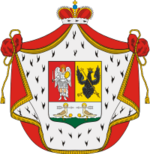Dimitri Obolensky
Knights Bachelor | |
|---|---|
| Academic background | |
| Alma mater | Trinity College, Cambridge (1937–42) |
| Thesis | The Bogomils: A Study in Balkan Neo-Manichaeism (1942) |
| Doctoral advisor | Elizabeth Hill |
| Influences | Francis Dvornik, Ihor Ševčenko, John Meyendorff |
| Academic work | |
| Institutions |
|
| Doctoral students | Anthony Bryer, Michael Angold, James Howard-Johnston, Jonathan Shepard, Simon Franklin |
| Notable works | The Byzantine Commonwealth: Eastern Europe, 500–1453 |
| Notable ideas | Byzantine commonwealth |
Dimitri Dimitrievich Obolensky 19 March] 1918–23 December 2001) was a Russian-British historian who was Professor of Russian and Balkan History at the University of Oxford and the author of various historical works.
Biography

After the
Obolensky became a distinguished
From 1949 to 1961, Obolensky was Reader in Russian and Balkan Medieval History at the University of Oxford (1949–1961) and subsequently Professor of Russian and Balkan History (1961–1985, Emeritus 1985–2001). He was also a Student of Christ Church, Oxford (1950–1985, Emeritus 1985–2001).[5] He later became Vice-President of the Keston Institute, Oxford.[4]
Obolensky's most enduring achievement was The
Obolensky was elected a
Obolensky married Elisabeth Lopukhin in 1947; they had no children, and the marriage was dissolved in 1989.[5]
Sir Dimitri died on 23 December 2001 at Burford in Oxfordshire. His memorial service was held in Christ Church Cathedral, Oxford, and he is buried at Wolvercote Cemetery.

Selected works
- Obolensky, Dimitri (1971). Byzantium and the Slavs: Collected Studies. London: Variorum Reprints.
- Obolensky, Dimitri (1974) [1971]. The Byzantine Commonwealth: Eastern Europe, 500-1453. London: Cardinal. ISBN 9780351176449.
- Obolensky, Dimitri (1982). The Byzantine Inheritance of Eastern Europe. London: Variorum Reprints. ISBN 9780860781028.
- Obolensky, Dimitri (1988). Six Byzantine Portraits. Clarendon Press. ISBN 9780198219514.
- Obolensky, Dimitri (2004) [1948]. The Bogomils: A Study in Balkan Neo-Manichaeism. Cambridge University Press. ISBN 9780521607636.
- Obolensky, Dimitri (1971). Bread of Exile: A Russian Family. Harvill Press. ISBN 1-86046-511-0.
Notes
- ^ a b c Shepard, Jonathan (2004). "Dimitri Dimitrievich Obolensky 1918–2001" (PDF). The British Academy.
- ^ S. Franklin, "Sir Dimitri Obolensky," Proceedings of the American Philosophical Society 148 (2004), 140, www.amphilsoc.org Archived 9 August 2017 at the Wayback Machine
- ^ "Professor Sir Dimitri Obolensky". The Telegraph. 7 January 2002.
- ^ a b "Sir Dimitri Obolensky". The Guardian. 4 January 2002.
- ^ a b c Bryer, Anthony (31 December 2001). "Obituary: Professor Sir Dimitri Obolensky". The Independent.
- ^ "APS Member History". search.amphilsoc.org. Retrieved 14 April 2022.
